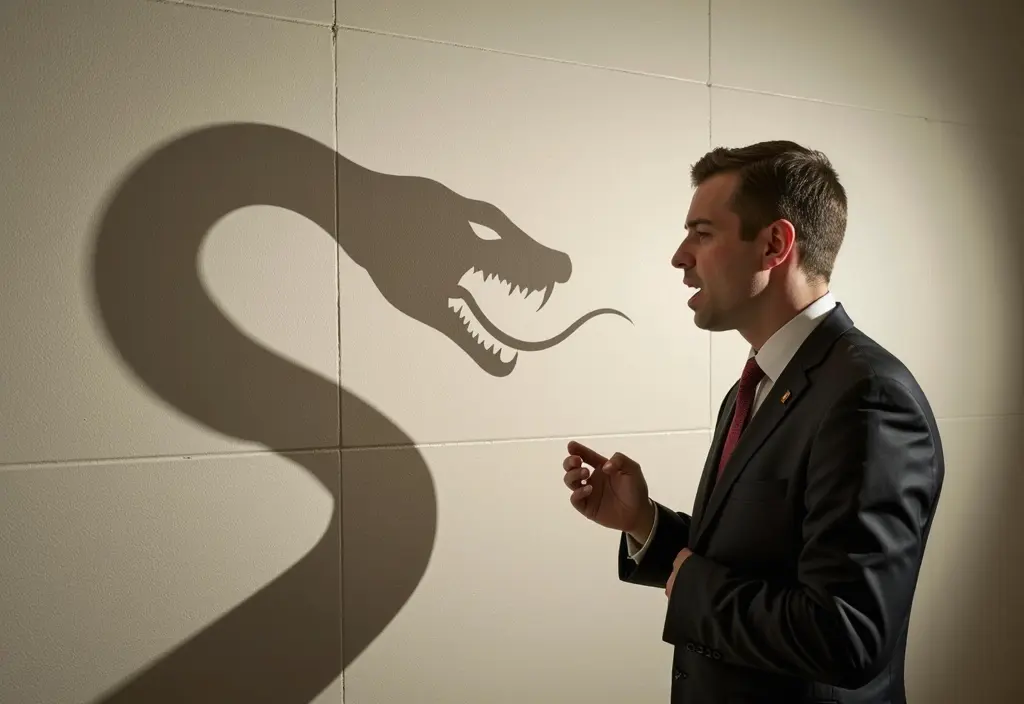There’s a special kind of tired that sinks deep into your bones when you’ve been dealing with a dishonest person. It’s more than just mental fatigue; it’s a soul-level exhaustion. I remember getting tangled up with a master manipulator years ago. Every single conversation was like trying to navigate a minefield of half-truths and perfectly polished lies. It was draining. I constantly second-guessed myself, my own sanity.
You walk away from people like that feeling empty, confused, and just a little bit dirty. It’s a silent battle that can quietly wreck your spirit. If you’ve been there, you know you aren’t crazy. And you’re right to feel that way. Deception cuts deep because it’s a direct assault on reality itself. It makes you question everything. But we have an anchor in that storm. The Bible doesn’t shy away from this topic; it’s brutally honest about it. If you’re asking what the bible says about liars and manipulators, you’re asking a question God has already answered with incredible clarity.
More in Ethics & Morality Category
What the Bible Says About Letting Go
What the Bible Says About Karma
Key Takeaways
- Deception is Anti-God: At its core, lying is the opposite of God’s character. He isn’t just truthful; He is Truth itself.
- Manipulation is Selfish Control: The Bible shows us that manipulation is just a weaponized form of lying, used to exploit others for personal gain.
- Discernment is a Spiritual Necessity: We’re not called to be gullible. Scripture urges us to pray for wisdom to see deceptive behavior for what it is by looking at a person’s “fruits.”
- Boundaries Are Biblical: Forgiving someone doesn’t mean you have to automatically trust them again. The Bible gives us a blueprint for setting healthy boundaries to protect ourselves.
- Truth Brings Freedom: Your real security isn’t in becoming a human lie detector, but in anchoring yourself to the rock-solid truth of God’s Word. That’s where real freedom is found.
Why Does God Take Lying So Seriously?
We like to put lies into different boxes, don’t we? We have our little “white lies,” the ones we tell to avoid hurting someone’s feelings. Then there are the big ones, the life-altering whoppers. In our heads, there’s a massive difference. But to get God’s perspective, we have to start with His character. He isn’t just some being who tells the truth. Jesus said it point-blank: “I am the way, and the truth, and the life” (John 14:6). Truth isn’t just something He does; it’s who He is. It’s the very atmosphere of heaven.
That means any lie—no matter how small—is a step out of reality. It’s a tear in the fabric of truth. It introduces something foreign into a world God wired for honesty. That’s why the Bible’s language about lying is so serious. It’s not just a bad habit; it’s an act that fundamentally opposes the Creator.
Isn’t a Little White Lie Harmless?
We’ve all done it. A friend shows off a wild new haircut and asks for our opinion. “It’s so you!” we blurt out, trying to be kind. We call it social grace. But the Bible forces us to dig deeper. Proverbs 6:16-19 lists seven things God finds detestable. Right there on the list are “a lying tongue” and “a false witness who breathes out lies,” right alongside things like “haughty eyes” and “hands that shed innocent blood.”
That’s some pretty heavy company. God places deception in the same category as arrogance and murder. He doesn’t grade on a curve. A “white lie” is still a lie, because every lie does the same thing: it twists reality. It promotes a fake version of events over what’s actually true. The Ninth Commandment is straightforward: “You shall not bear false witness against your neighbor” (Exodus 20:16). It’s a basic rule for any healthy society, because truth is the soil where trust grows. Without trust, everything falls apart.
So, Where Did Deception Even Originate?
To find the source of lying, you have to go all the way back to the beginning. The very first lie told to a human being came from the serpent in the Garden of Eden. “You will not surely die,” he hissed, flatly contradicting God’s clear command (Genesis 3:4). That single lie, that one manipulative twist of God’s Word, kicked off the fall of humanity. It had one goal: to plant a seed of doubt about God’s goodness and His word.
Jesus later fills in the backstory. He identifies Satan as “a murderer from the beginning.” He continues, “there is no truth in him. When he lies, he speaks out of his own character, for he is a liar and the father of lies” (John 8:44). This is a game-changer. Lying isn’t just something Satan does; it is his very nature. It’s his mother tongue. So whenever we encounter lies and manipulation, we are hearing the native language of God’s enemy, a strategy designed to steal, kill, and destroy.
How Can I Spot a Manipulator in My Life?
Spotting a blatant lie can be simple. If someone says the sky is green, you know they’re not being straight with you. But manipulation is a different animal. It’s a much more subtle and insidious art. A manipulator is a liar who has weaponized deception. They don’t just tell falsehoods; they weave complex webs of words and emotions to control you. They want you to do their bidding while making you think it was your idea. It’s the difference between being hit with a club and being slowly poisoned. Both can be deadly, but one is a lot harder to see coming.
Learning to recognize these tactics isn’t about becoming a cynic. It’s about being wise. It’s about guarding your heart, as Proverbs 4:23 tells us: “Keep your heart with all vigilance, for from it flow the springs of life.” You can’t guard your heart if you can’t even see the attack coming.
Do They Twist My Words to Make Me Feel Guilty?
This is a classic, painful move. You say something simple and clear. By the time they’re finished talking, you’re the one apologizing. They are masters at twisting your intentions and reframing your words to make you the villain. This form of emotional abuse, often called gaslighting, is engineered to make you doubt your own sanity.
I remember a coworker who was a genius at this. I’d point out a clear mistake he’d made, and by the end of our five-minute conversation, I’d walk away feeling somehow responsible for his mess-up. He’d say things like, “Well, if you had explained it more clearly, I wouldn’t have been so confused.” It was bewildering. A simple, factual statement got twisted into a critique of my leadership. The Pharisees constantly tried to do this to Jesus. They’d ask loaded questions, like the one about paying taxes to Caesar (Matthew 22:15-22), not to find truth, but to twist whatever he said and use it against him.
Are They Constantly Using Flattery to Get Their Way?
There is a whole world of difference between genuine encouragement and manipulative flattery. Encouragement builds you up; flattery butters you up. Encouragement is selfless; flattery always has an agenda. A manipulator uses praise like a currency to buy your compliance. They shower you with compliments when they want something, making you feel special, which makes it much harder to say no when they finally ask for something.
Proverbs warns us about this. “A flattering mouth works ruin” (Proverbs 26:28). And, “Whoever flatters his neighbor is spreading a net for his feet” (Proverbs 29:5). Flattery is a trap. It feels good for a moment, but it’s setting you up. Think of a fisherman’s lure. The fish doesn’t see the hook; it only sees the shiny object. That lure is the manipulator’s flattery. Learning the difference between a sincere compliment from the heart and a strategic one with strings attached is a vital survival skill.
Does It Always Seem to Be About What They Want?
At its core, manipulation is just pure selfishness. A healthy relationship is a two-way street. A manipulative dynamic, however, is a one-way street. The manipulator’s needs, feelings, and desires are always the main event. They might pretend to be interested in you, but the conversation always finds its way back to them. They see other people not as human beings to love and respect, but as pieces on a chessboard to be moved for their own benefit.
A classic biblical example is Absalom, King David’s son. The Bible says he would hang out at the city gate, listen to people’s problems, and say, “If only I were judge in the land! Then every man with a dispute or cause might come to me, and I would give him justice” (2 Samuel 15:4). He was faking it. He offered false sympathy and empty promises, but his goal wasn’t justice. It was about his own raw ambition. The scripture says he “stole the hearts of the men of Israel.” He manipulated an entire nation with smooth, self-serving words, all part of a deceitful plot to take his father’s throne. When it’s always about them, that’s a huge red flag.
What Are the Ultimate Consequences of a Deceptive Life?
The Bible is a book of cause and effect. Our choices matter. The character we build day by day has consequences. And while God is incredibly merciful, He is also a God of justice who doesn’t just look the other way. Deception isn’t a neutral act. It’s a destructive force, and Scripture is clear that it leads to ruin, both for the person doing the deceiving and for those they deceive.
The fallout happens on two levels. First, there’s the immediate, relational wreckage that lying causes on earth. It demolishes trust, the very glue of human connection. But the Bible also pulls the curtain back to show us that the stakes are even higher, speaking of an eternal consequence for those who build their lives on a foundation of lies.
Does the Bible Actually Say Liars Go to Hell?
This is a heavy question, and it deserves a straight answer. The Bible doesn’t pull punches. Revelation, describing the end of all things, paints a stark picture. In Revelation 21:8, it lists those who will be outside the Holy City: “…the cowardly, the faithless, the detestable, as for murderers, the sexually immoral, sorcerers, idolaters, and all liars, their portion will be in the lake that burns with fire and sulfur, which is the second death.”
That is a terrifying verse. But the context is crucial. This isn’t talking about a person who tells a lie, feels horrible, and repents. It’s describing someone whose entire identity is wrapped up in deception. The phrase “all liars” points to a character trait, not a one-time mistake. It’s the person who, like the “father of lies,” has made deception their very nature. God’s forgiveness is available for any sin, including lying, when we turn to Christ. But for the one who refuses to change and instead embraces a life of deceit, the Bible’s warning is severe.
How Exactly Does Lying Destroy Relationships?
Long before any eternal consequences, deception goes to work destroying our earthly relationships. Trust is the invisible thread that holds two people together. Every lie is a snip at that thread. A single lie can damage it; a habit of lying will sever it completely. Once trust is gone, real intimacy becomes impossible. The relationship becomes a hollow shell, filled with suspicion and insecurity.
I once had a close friendship that was destroyed by this. My friend started making up stories—not huge, malicious lies, but a constant stream of exaggerations to make his life seem more interesting. For a while, I tried to ignore it. But eventually, I realized I couldn’t believe a word he said. The trust was gone. Our conversations became shallow because I was always second-guessing him. The friendship, sadly, just couldn’t survive it. Proverbs 25:18 nails it: “A man who bears false witness against his neighbor is like a war club, or a sword, or a sharp arrow.” A lie is a weapon. It bludgeons, slashes, and pierces the heart of a relationship.
- It creates an atmosphere of suspicion: You start questioning everything they say, big or small.
- It prevents genuine vulnerability: How can you share your heart with someone you can’t trust?
- It isolates the liar: They become trapped in a lonely world of their own making, constantly having to remember which lie they told to whom.
- It inflicts deep emotional pain: Being lied to feels like a profound betrayal and disrespect.
According to the Bible, How Should I Handle a Manipulator?
This is where it gets real. Identifying a problem is one thing; knowing what to do about it is another. When you realize you’re dealing with a manipulator, especially if it’s someone close to you, the way forward can be confusing. Your desire to be a loving, forgiving Christian can feel like it’s at war with your need for safety and truth.
The Bible’s wisdom here is incredibly practical. It doesn’t call us to be doormats. It never commands us to endlessly put up with deception in the name of love. Instead, it provides a powerful framework for handling these toxic situations with grace, truth, and firm boundaries. It teaches us to be both “wise as serpents and innocent as doves” (Matthew 10:16). This isn’t about getting even. It’s about righteous, self-preserving action.
Am I Really Supposed to Just Forgive and Forget?
“Forgive and forget” is a popular saying, but it’s not biblical. The forgiving part? That’s non-negotiable. Jesus was clear: if we want God’s forgiveness, we have to give it to others (Matthew 6:14-15). Forgiveness is a transaction between you and God. It’s you choosing to release their debt, refusing to carry the weight of bitterness. It sets you free.
Reconciliation, however, is a two-way street. Forgiveness is your part. Reconciliation requires their participation—namely, repentance and a change of behavior. You can forgive a manipulator completely while also choosing not to trust them or let them back into a position where they can hurt you. Trust has to be earned. Forgiveness is a gift. If a person has a proven pattern of deception and shows no real sign of changing, keeping them at a safe distance isn’t un-Christian. It’s wise. Proverbs 26:24-25 gives a chilling warning: “Whoever hates disguises himself with his lips and harbors deceit in his heart; when he speaks graciously, believe him not, for there are seven abominations in his heart.”
How Can I Set Boundaries Without Being Un-Christian?
Somehow, an idea has crept into Christian culture that having boundaries is selfish. Nothing could be further from the truth. A boundary is simply a line you draw to protect what God has given you: your heart, your mind, your peace. A boundary says, “I love you, but I will not participate in this dysfunction. I will not allow you to speak to me this way. I will not let your deception create chaos in my life.”
Jesus himself was a master of boundaries. He often withdrew from the demanding crowds to rest and pray. He did not say yes to every single request. Setting a boundary is one of the most loving things you can do—for yourself and, believe it or not, for the other person. It lovingly prevents them from continuing their sin at your expense. The process in Matthew 18 for confronting a brother who has sinned is all about setting boundaries. It’s about speaking the truth clearly and establishing consequences if the behavior doesn’t change. It’s about doing it “in love” (Ephesians 4:15), with the goal of restoration, not punishment.
What if the Liar Is a Family Member or Someone in My Church?
These are the most gut-wrenching scenarios. The stakes are higher, the potential for collateral damage is immense. When the manipulator is a parent, a spouse, or a respected church member, it’s tempting to just keep the peace. But a peace that’s bought with your silence in the face of deception is a false peace.
The biblical principles don’t change based on your relationship with the liar, but applying them certainly takes extra prayer and courage. This is where seeking outside counsel is so important. Proverbs 11:14 says, “Where there is no guidance, a people falls, but in an abundance of counselors there is safety.” Find a trusted pastor, elder, or a professional Christian counselor. You don’t have to walk this road alone. They can provide an objective perspective and help you form a plan. Sometimes, the most loving thing you can do is to love from a distance, praying for their repentance while protecting yourself and your family from their destructive patterns.
How Can I Truly Protect My Heart From Deception?
In the end, you can’t control whether other people choose to lie. Deception is a fact of our fallen world. But you can control how you prepare for it and how you respond. The Bible’s ultimate solution isn’t about becoming a perfect human lie detector. It’s about becoming so rooted in the truth that a lie feels foreign, like a sour note in a beautiful song.
This is a proactive, spiritual discipline. Protecting your heart isn’t a passive wish; it’s an active, daily pursuit of God. It’s about building a spiritual immune system strong enough to fight off the infection of deceit. The goal is to make your heart a place where truth feels at home, and lies can’t find anywhere to stay.
Is There a Way to Get Better at Spotting Lies?
Yes, but not in the way the world tells you. The world says to look for tells—shifty eyes, nervous habits. The Bible points us in a different direction. The key to spotting a counterfeit is not to study the counterfeit. It’s to study the genuine article so thoroughly that you recognize a fake instantly. The best defense against lies is a deep familiarity with the truth. As you immerse yourself in God’s Word, the Holy Spirit, the “Spirit of truth” (John 16:13), sharpens your discernment.
You learn to measure people’s words against the character of God. You start paying more attention to the fruit of their lives than the floweriness of their language. As Jesus said, “you will recognize them by their fruits” (Matthew 7:16). Are their lives marked by love, joy, peace, and patience? Or by chaos, discord, and selfishness? Their actions will eventually speak louder than their deceitful words. For a deeper dive into growing this skill, Dallas Theological Seminary offers insightful resources on developing biblical discernment.
Here are some practical ways to cultivate this discernment:
- Daily Immersion in Scripture: Make God’s Word the primary voice in your life.
- Prayer for Wisdom: James 1:5 promises that if you ask for wisdom, God will give it generously. Make this a daily request.
- Community with Wise Believers: Surround yourself with people who love the truth and will speak it to you honestly.
- Patience and Observation: Don’t rush to trust. Watch people’s lives over time. Character is revealed in patterns, not in a single performance.
In What Way Does God’s Truth Actually Set Me Free?
Jesus made one of the most profound promises in all of Scripture in John 8:32: “and you will know the truth, and the truth will set you free.” This is the ultimate answer to the problem of liars and manipulators. The freedom He offers is comprehensive. It is freedom from the confusion and anxiety that deception creates. It is freedom from the bondage of a toxic, manipulative relationship. It is freedom from the fear of being controlled or duped.
When your sense of identity, worth, and security is firmly anchored in the unchanging truth of who God is and who He says you are, the lies of others begin to lose their power. Their flattery doesn’t inflate you, and their criticism doesn’t crush you, because you are living for an audience of One. You are no longer tossed back and forth by the waves of their deceptive words. You are standing on the rock of God’s truth. And that is the safest, most liberating place you can possibly be.
Your Anchor in a World of Words
Navigating a world filled with half-truths and outright lies can be exhausting. The pain inflicted by a liar or manipulator is real and it is deep. But you are not left defenseless. God sees, He knows, and He has provided a clear path forward in His Word. He hates deception not just because it offends His holy character, but because He loves you and He knows the profound damage it does to your soul.
He calls you to be wise, to be discerning, and to guard your heart. He gives you permission to set boundaries and protect yourself from harm. And most of all, He invites you into a relationship with Himself—the very source of all Truth. By anchoring your life in Him, you will find the wisdom to navigate the lies of this world and the freedom that only His truth can bring.
You don’t have to live in fear of deception.
Let the truth be your shield.
FAQ – What the Bible Says About Liars and Manipulators

What does the Bible teach about handling manipulative or deceitful people?
The Bible advocates for wisdom, setting healthy boundaries, forgiving while protecting oneself, seeking outside counsel, and trusting in God’s truth to navigate relationships with manipulators effectively.
How can one recognize if someone is a manipulator rather than just a liar?
A manipulator uses deception subtly by weaving complex webs of words and emotions to control others, often twisting words to make others feel guilty or to serve selfish goals, unlike blatant lying.
Where did the origin of deception come from according to biblical history?
The origin of deception traces back to Satan in the Garden of Eden, who lied to Eve, and Jesus describes Satan as ‘the father of lies,’ indicating deception is his native language.
Are white lies really harmless according to the Bible?
No, the Bible equates all lies, including white lies, with deception, which is detestable to God because it twists reality and undermines trust.
Why does the Bible consider deception and lying to be such serious sins?
The Bible considers deception and lying to be serious sins because they directly oppose God’s character of truthfulness. Jesus identified Himself as




